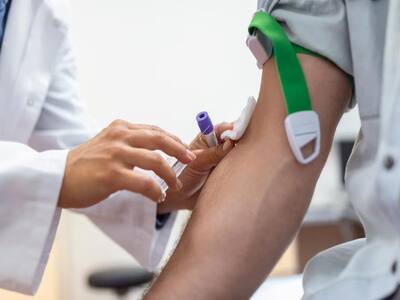
Physicians can significantly improve treatment outcomes for patients with lung cancer using liquid biopsy, which will open the door to more effective and precise oncology procedures.
World Lung Cancer Day 2023: The increasing incidence of lung cancer is alarming in India. Genomic biomarker-based precision medicine has revolutionized lung cancer treatment over the last two decades. The tissue biopsy is the standard approach for diagnosing lung cancer and identifying genetic alterations. Still, it has constraints such as a shortage of tissue and intrusive procedures, making it difficult to get enough samples for proper testing at all times. Dr Suruchi Aggarwal, PhD, Head Scientific Affairs – Oncology, MedGenome, shares that some patients may be denied timely and appropriate care, resulting in inferior outcomes.
Liquid Biopsy
However, a game-changing solution has emerged in the form of liquid biopsy. This non-invasive technique analyses circulating tumour DNA (ctDNA) released from dying tumour cells in the bloodstream. Liquid biopsy offers a valuable alternative to tissue biopsy, especially when tissue samples are scarce or inaccessible. It enables healthcare professionals to gain comprehensive insights into the genetic landscape of cancer, allowing for personalized treatment strategies.
Advantages Of Liquid Biopsy
One of the main advantages of liquid biopsy is its non-invasiveness, eliminating the need for surgical procedures and causing less discomfort to patients. Also, unlike tumour biopsy, it is not localised or confined to a specific site but captures material shed from all tumour sites in the body, ensuring complete genomic profiling. Through ctDNA testing, liquid biopsy can help target lung cancer when conventional methods are not feasible or practical. This genetic information allows physicians to intervene on time, improving the chances of successful treatment.
Progression And Treatment
Moreover, liquid biopsy is crucial in monitoring disease progression and treatment response. In lung cancer cases where targeted therapies are initially effective, the disease may eventually become resistant to treatment, leading to relapse. A liquid biopsy helps identify specific genetic changes responsible for acquired resistance, guiding physicians in selecting more appropriate medicines to combat the evolving cancer.
READ RELATED: 6 Restaurant Chains With the Best Value Menus
Through Liquid Biopsy
Medical practitioners can design personalized treatment strategies tailored to each patient’s genetic makeup. The analysis of ctDNA enables the detection of genetic alterations and resistance mutations in real time, allowing for prompt treatment adjustment. This personalized approach enhances the efficacy of lung cancer treatment, increasing the likelihood of positive outcomes for patients.
Conclusion
The difficulties with tissue-based testing in lung cancer may prevent rapid and efficient treatment. However, liquid biopsy has become an effective method to circumvent these problems. The non-invasive procedure and the ability to identify genetic alterations in ctDNA flowing freely in the blood allow for individualised treatment plans for newly diagnosed and relapsed patients. Physicians can significantly improve treatment outcomes for patients with lung cancer using liquid biopsy, which will open the door to more effective and precise oncology procedures.
Total Wellness is now just a click away.
Follow us on
Don’t Miss Out on the Latest Updates.
Subscribe to Our Newsletter Today!
window.addEventListener(‘load’, (event) => {
$(‘#commentbtn’).on(“click”,function(){
(function(d, s, id) { var js, fjs = d.getElementsByTagName(s)[0]; if (d.getElementById(id)) return; js = d.createElement(s); js.id = id; js.src = “//connect.facebook.net/en_US/sdk.js#xfbml=1&version=v2.3”; fjs.parentNode.insertBefore(js, fjs);}(document, ‘script’, ‘facebook-jssdk’));
$(“.cmntbox”).toggle();
});
});






